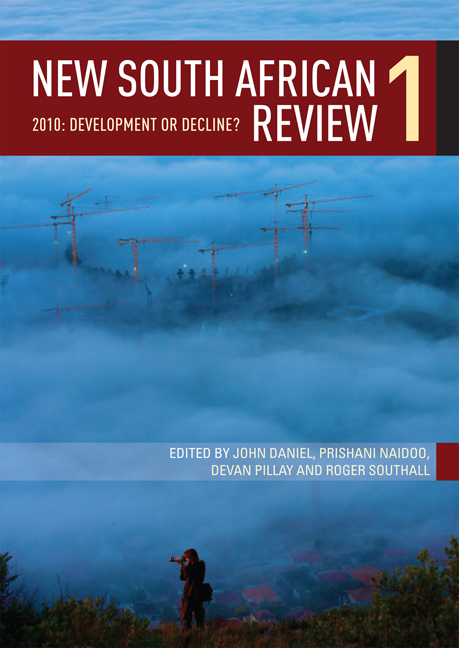Book contents
- Frontmatter
- Contents
- Preface
- Introduction South Africa 2010: From short-term success to long-term decline?
- PART 1 ECONOMY, ECOLOGY AND SUSTAINABILITY
- Introduction South Africa and the eco-logic of the global capitalist crisis
- CHAPTER 1 The state of the South African economy
- CHAPTER 2 The international economic crisis and employment in South Africa
- CHAPTER 3 The economic impact of South Africa's 2010 World Cup: Ex ante ambitions and possible ex post realities
- CHAPTER 4 Growth, resource use and decoupling: Towards a ‘green new deal’ for South Africa?
- CHAPTER 5 Planning for sustainable living with limited water
- PART 2 STATE, POLITICS AND POLICY
- PART 3 EDUCATION, HEALTH AND LAND
- PART 4 Doreen Atkinson
- Contributors
- Index
CHAPTER 5 - Planning for sustainable living with limited water
from PART 1 - ECONOMY, ECOLOGY AND SUSTAINABILITY
Published online by Cambridge University Press: 21 April 2018
- Frontmatter
- Contents
- Preface
- Introduction South Africa 2010: From short-term success to long-term decline?
- PART 1 ECONOMY, ECOLOGY AND SUSTAINABILITY
- Introduction South Africa and the eco-logic of the global capitalist crisis
- CHAPTER 1 The state of the South African economy
- CHAPTER 2 The international economic crisis and employment in South Africa
- CHAPTER 3 The economic impact of South Africa's 2010 World Cup: Ex ante ambitions and possible ex post realities
- CHAPTER 4 Growth, resource use and decoupling: Towards a ‘green new deal’ for South Africa?
- CHAPTER 5 Planning for sustainable living with limited water
- PART 2 STATE, POLITICS AND POLICY
- PART 3 EDUCATION, HEALTH AND LAND
- PART 4 Doreen Atkinson
- Contributors
- Index
Summary
The development of our society, our growing population, and the legitimate demands of the disadvantaged majority for access to that most crucial natural resource – water – have placed new demands on what is, although renewable, a limited resource that can easily become polluted or over-used. There is only so much water that falls on our land every year. Unless we wish to begin to remove the salt from our vast resources of sea water (a very expensive process that requires enormous amounts of energy) we have to live within our means (Department of Water Affairs and Forestry 1997: p.2 [emphasis added])
INTRODUCTION: Water as a ‘lead sector’ in planning for sustainability
In 1998, water resources in South Africa were effectively nationalised. This went largely unremarked, save for a cursory mention by the Free Market Foundation (Harris 2002). It was in part because the measure was carefully designed and expressed as a deprivation of property rights, through regulation in the execution of a public trust, rather than an outright expropriation. The intention was to ensure that, given the limited availability of a natural resource essential for diverse social, economic and environmental purposes, it would be available for use in the public interest. Nonetheless, what had been permanent property rights were transformed by legislation into temporary use rights with a maximum term of forty years.
An important dimension of the general public interest argument was that this policy created the formal framework for adaptation to future environmental changes which, in the face of climate change and other pressures, is increasingly recognised as vital for the achievement of sustainable development. The public interest requirements of achieving environmental sustainability were highlighted as a key justification for what otherwise could have been considered a ‘taking’ of property:
‘It is submitted that these statutory powers contained in the NWA are suitably formulated to comply with the constitutional protection of property rights, if they are delicately exercised to reasonably balance property rights with the public interest, where the scarcity of water, the environmental requirement of sustainable use and the socioeconomic requirements are the factors which contribute to the determination of the public interest in water resources management’ (Uys 2009).
- Type
- Chapter
- Information
- New South African Review2010: Development or Decline?, pp. 135 - 156Publisher: Wits University PressPrint publication year: 2010



